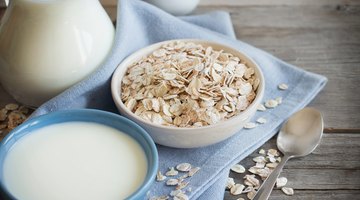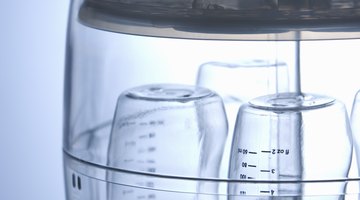Can You Drink Homogenized Milk When Pregnant?
Drinking milk is a way for pregnant women to get the calcium they need for a healthy pregnancy. Most milk sold in grocery stores is homogenized. Homogenized milk is treated so the fat globules don't separate from the rest of the milk. With homogenized milk, cream doesn't rise to the top. If you purchased non-homogenized milk, you'd have to shake the carton to remix the fat with the rest of the milk every time you wanted to pour a glass.
Milk and Pregnancy
Milk is a source of calcium, which you need to protect your bones and to help your baby grow and develop. And drinking milk while you're pregnant could have other benefits. A study by researchers at the Harvard School of Public Health, reported at the 2010 meeting of the American Academy of Neurology, surveyed 35,794 nurses and their mothers and found that drinking four or more glasses of milk a day during pregnancy decreased the risk of female children developing multiple sclerosis in later life by 56 percent. Researchers believe the vitamin D in milk may provide protection against multiple sclerosis.
Homogenization Process

Can Pregnant Women Drink Ultra-Pasteurized Milk?
Learn More
To prevent the fat globules in milk from floating to the top of the milk, you have to reduce the size of those globules. To do this, milk processors force the milk through very fine screens, which break down the fat into tiny particles that mix with the rest of the milk. No chemicals or additives are used in this process. This filtering may be done while the milk is heated, during pasteurization.
Benefits of Homogenization
By reducing the size of the fat globules in milk, homogenization makes milk easier to digest, says Marie-Caroline Michalski, writing in the April 2007 "Journal of Nutrition." As part of the homogenization and pasteurization process in the United States, milk producers fortify milk with vitamins A and D, important vitamins for health and fetal development.
Alternatives to Homogenization

How to Switch Back & Forth From Breastfeeding to Bottle Feeding
Learn More
The alternative to homogenized milk is raw milk. Though many websites tout the health benefits of raw milk, the Centers for Disease Control and Prevention reports that raw milk can harbor many harmful bacteria. Between 1998 and 2008, 1,676 illnesses, 191 hospitalizations and two deaths were linked to consumption of raw milk. The CDC says that pregnant women, infants, young children, the elderly and anyone with a compromised immune system should not drink raw milk.











